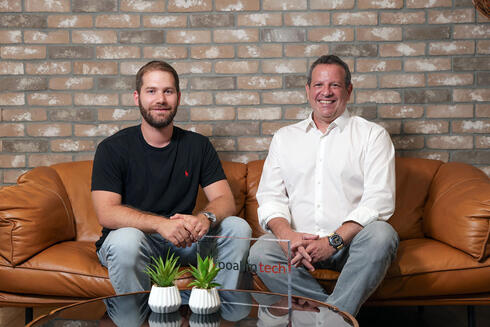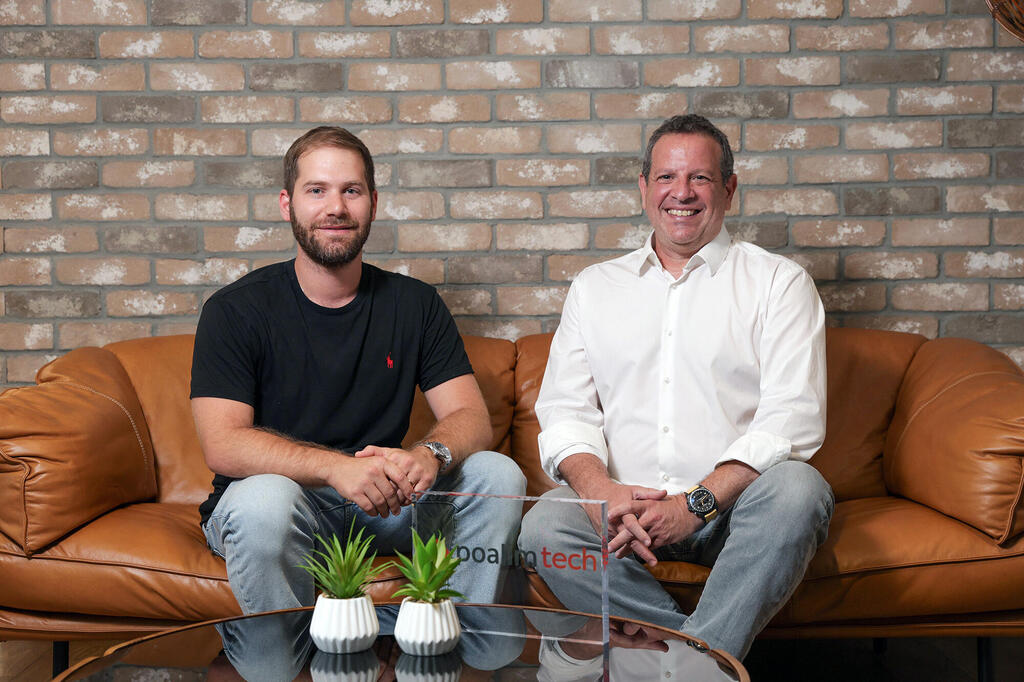
"Don't fall in love with ideas"
In a mentoring meeting as part of the Growth+ project by Calcalist and Poalim Tech, Joel Bar-El from Trax and Liad Elidan from Milestone discussed how to navigate crises and adapt companies to changing market conditions.
Joel Bar-El, co-founder of Trax, which developed computer vision and data processing solutions for the retail world, and Liad Elidan, CEO of Milestone, which develops a platform for implementing and measuring GenAI in organizations, sat down to discuss how to learn to change during a crisis and adapt your company to the market.
The conversation was held as part of the Growth+ project by Calcalist and Poalim Tech, involving a series of 1:1 meetings between experienced entrepreneurs and early-stage start-up companies, with the goal of providing advice, support, and knowledge on entrepreneurship, creativity, managing start-ups, and building companies for growth.
Joel, can you tell us about a crisis you encountered at the beginning of your journey and what you learned from it that can help young entrepreneurs?
"The first company I founded with two partners was a software code development company, and we invested a lot of resources there. It took us two and a half years to develop a software development language called Tarsus, only to discover that at the end of the process all the software development tools in the world became free. Until then, they charged money for development tools, language, and compilers. We had no choice but to release it as open source because no one would pay for a language when all the other languages on the market are free, especially a new language.
"I learned two things from this: one is to know how to read the market looking ahead, to see where things are going, and also to recognize that opportunities can emerge from a crisis. We knew how to pivot the company and turn it into something else."
Liad, what is the biggest difficulty you encountered this year?
"The biggest difficulty is the atmosphere of war and uncertainty about the future of the company. For example, this week, my head of engineering is in the IDF reserves. When you're less than 10 people in a team, everyone matters. Regarding future fundraising, so far it hasn't hurt me, but you hear lots of stories. A year ago, it was the war in Ukraine; before that, the judicial reform; now, we are in a year of war. All these things add pressure to an entrepreneur's life. Previously, the uncertainty was in the features and the customers; now, the uncertainty is the politics and the economy, which adds another very significant layer."
Joel, what advice did you give him?
"Any period of difficulty—whether it's the pandemic or the current war—is a time to be more 'lean' in terms of the company to overcome the difficult period. Usually, after every difficult period comes a period of growth, so it might be worth waiting a little while when it comes to fundraising because I think that in half a year it will be a better time for fundraising."
What did you learn from each other?
Joel: "I really enjoyed seeing the thought process behind the product. There is still no full adequacy here to the needs of the market, and it's essential to adapt to what the market needs. People are in love with their ideas, and I really liked this change that Liad made. It's something I can learn from him—to look and constantly reassess decisions and change when the reality around you changes."
Liad: "It's amazing to see that someone who manages hundreds of people pays attention to very technical details and can get into the small details. I leave with a lot of thoughts about the product at the level of the business message—combining the product with the business from the perspective of someone like Joel, who has been with startups and reached a situation of huge sales and hundreds of employees. It provides a lot of value."
What’s something interesting or surprising you learned about each other?
Liad: "Joel's son serves in the same unit as I did, Meitar-Moran."
Joel: "Liad has an Irish partner whom he met during a student exchange he did at Trinity College in Dublin."
Michal Kissos Hertzog, CEO of Poalim Tech, concluded: “In my conversations with entrepreneurs, I always talk about developing the ability to understand ahead of time where they would like to be in the future, what mistakes can be avoided, and what their future lessons are - with an emphasis on today. This ability allows entrepreneurs to write the path of their startup themselves. An entrepreneur who gives this ability a place, knows how to conduct themselves better and more correctly even in the face of unexpected or unplanned scenarios."















